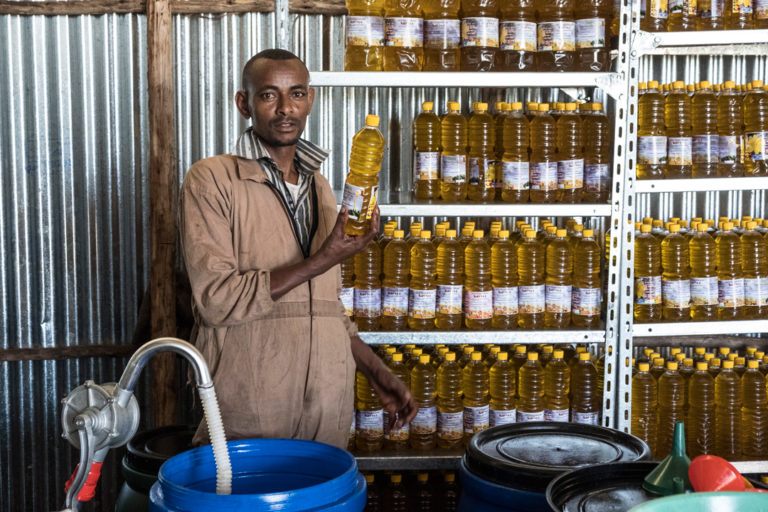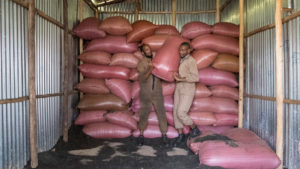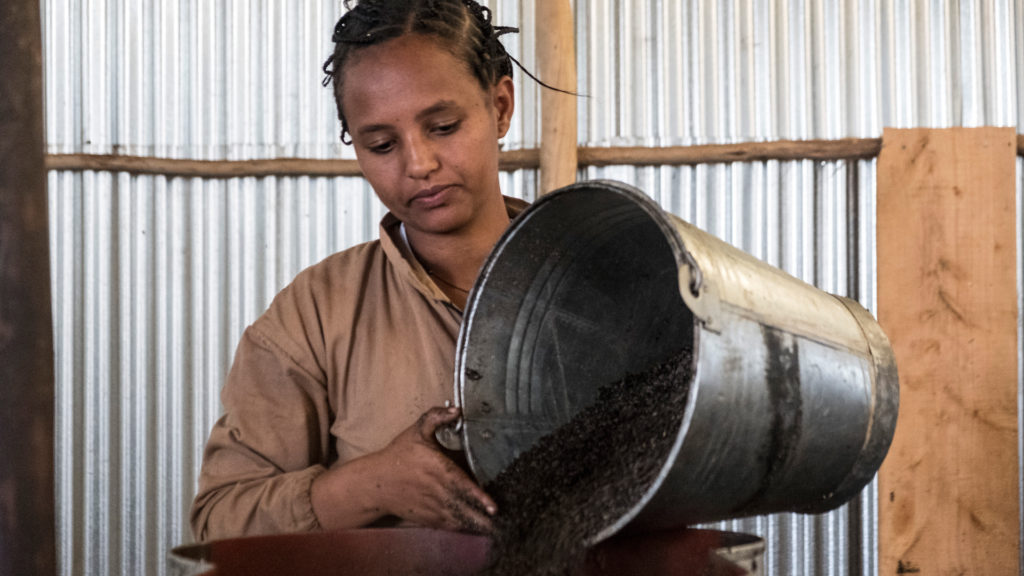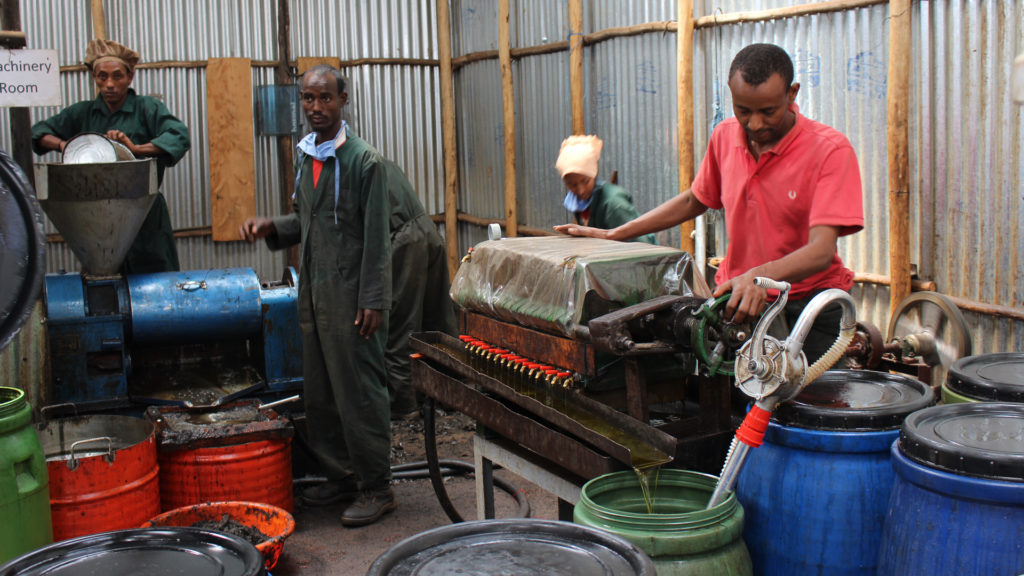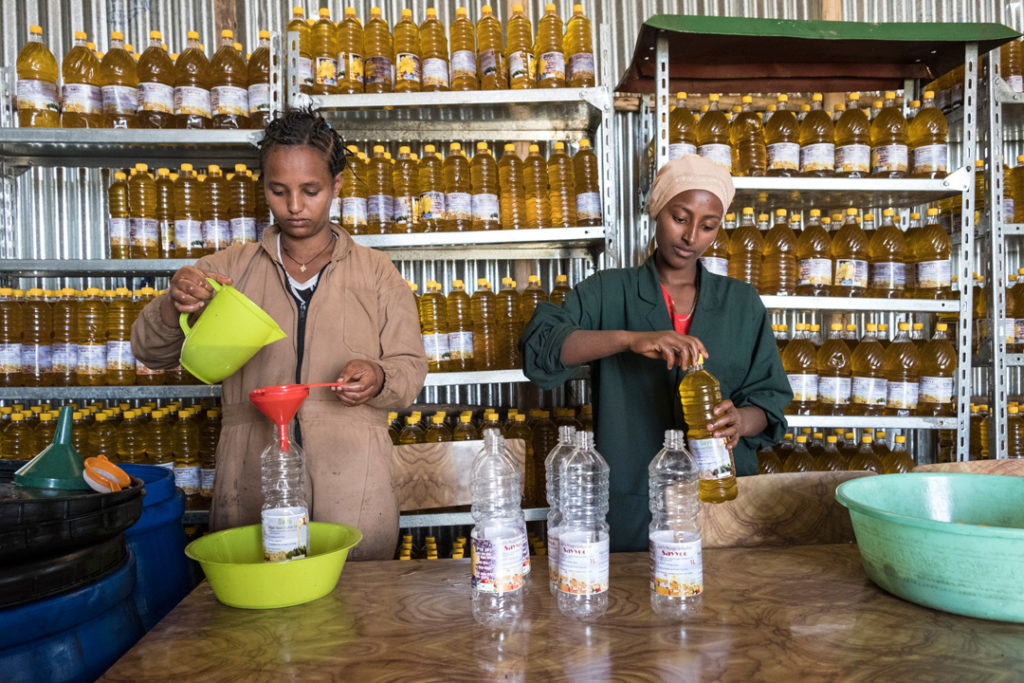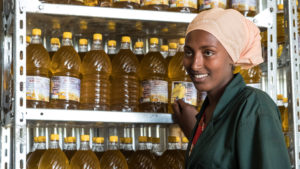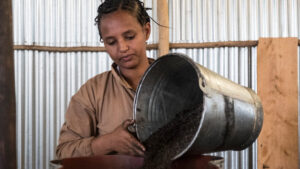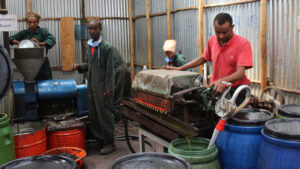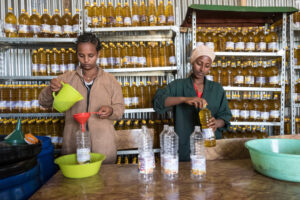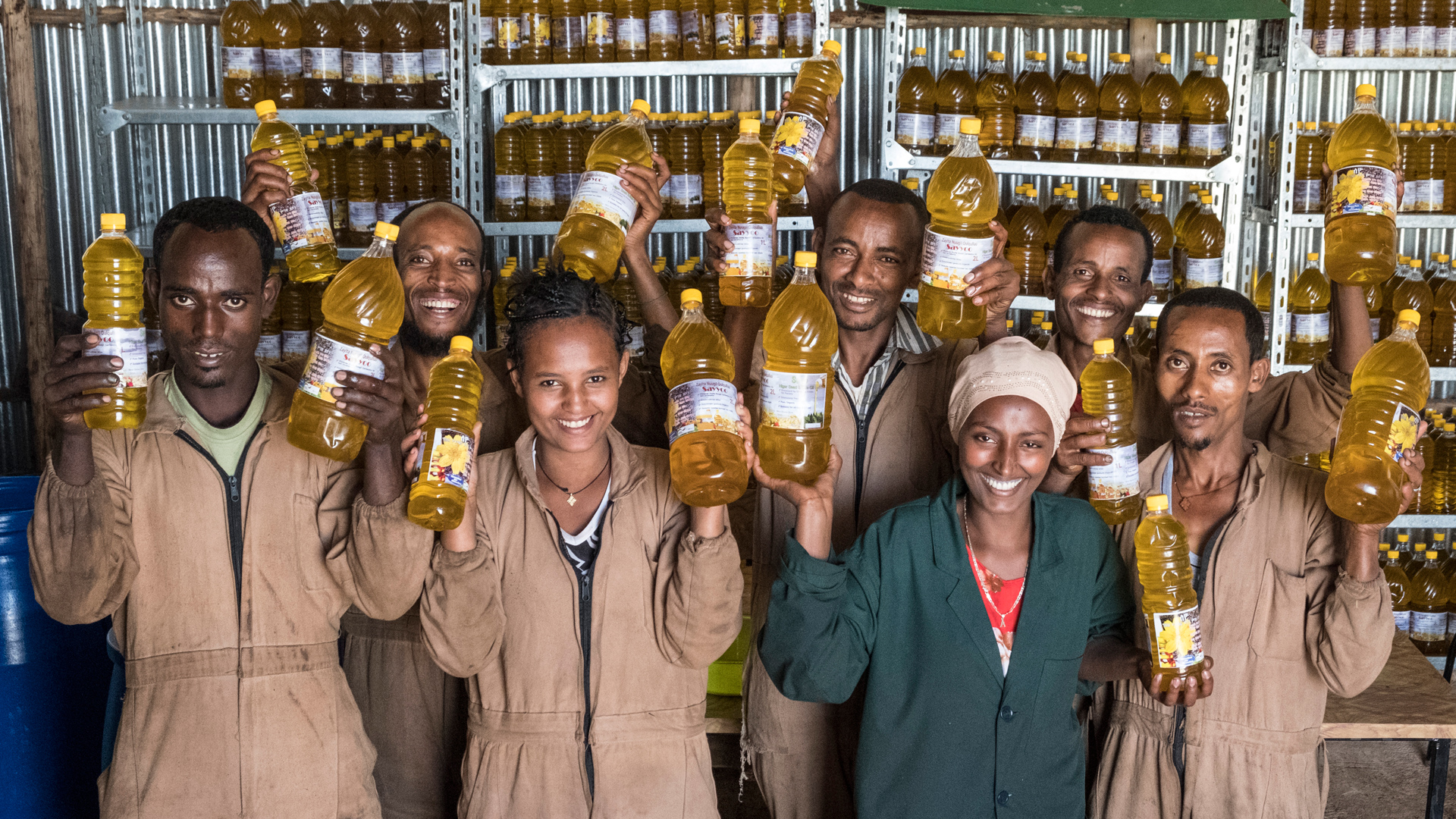
Green is for hope
Project area: Dano
In the Dano project area Menschen für Menschen initiated the founding of agricultural production and marketing organisations in cooperation with German Society for Inter-national Cooperation (GIZ). Whether it is honey, cooking oil or animal feed: the “Green Innovation Centre” programme helps to boost productivity in agriculture and creates jobs and income in the local area. New local value-added chains ensure that the people benefit from the treasures of their region.
The location of this start-up is a dusty back yard of about 20 m², carefully laid out with red plastic sheets. Their purpose is to prevent loss of the precious commodity to be processed by the young entrepreneurs – six women and four men – in the next few hours. “The Niger seeds are very light. The slightest gust of wind is enough to scatter it in all directions,” explains Sheleme Jonfe.
Eight-month-old son Adonech is sleeping on the 25-year-old’s arm. Her shift is due to begin soon, and then she will lay the toddler on a blanket in the shade. If he wakes up and cries, she will have to take him on her arm again and breastfeed him.
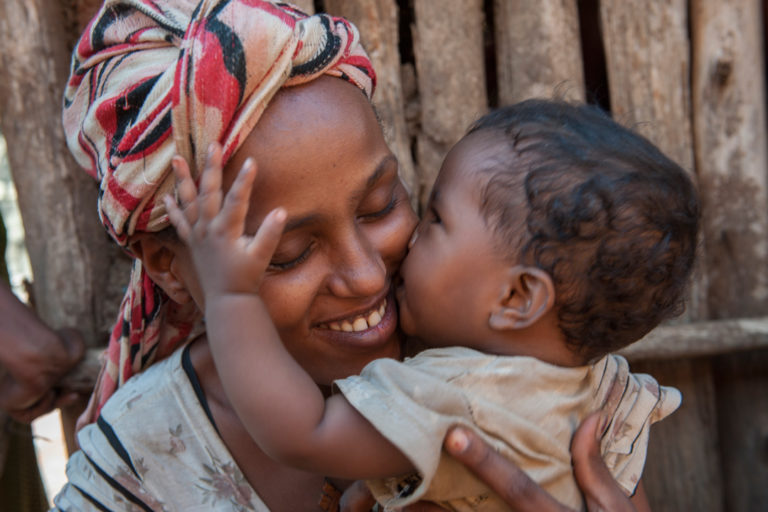
But in this business it is no problem to interrupt her work. Who is to stop her? Sheleme Jonfe, a shy woman who wears the small wooden cross of the country folk around her neck, is not an employee who has to follow orders from a boss. She is one of the founders and proprietors of the business start-up.
The village of Ayeru is located a few kilometres from the town of Seyo in the Dano project region, about 230 kilometres west of Addis Ababa. In early 2017 Sheleme Jonfe and nine fellow youngsters came together at the initiative of the Menschen für Menschen Foundation to form a cooperative. Their business model is remarkably simple: they buy sacks of Niger seed – the oily seed of the guizotia plant that is used for many purposes in Ethiopia – from farmers in the surrounding area. Then they free the seeds from impurities and sell them to an oil mill.
They called their cooperative “Spring Culture”, perhaps because this founding was the start of a new life for them all. Prior to becoming young entrepreneurs, the women and men were unemployed – and there were no signs that this situation would soon change. “My husband, our son and I used to subsist on what our small piece of land yielded. But it was never enough,” says Sheleme. “Since we started the cooperative, I can contribute something to the household expenses.”
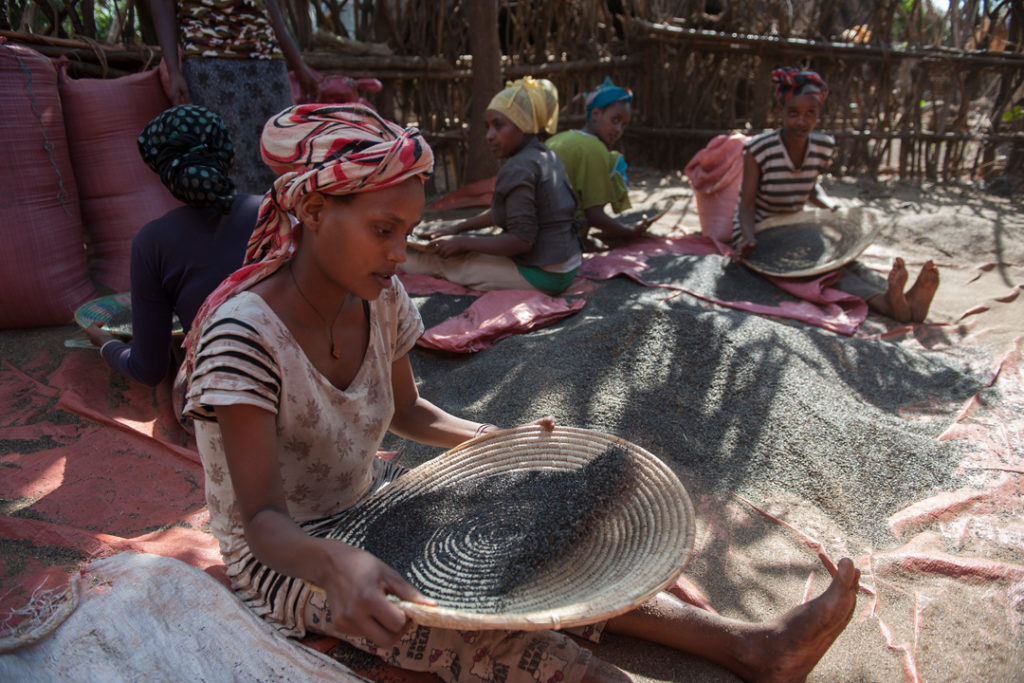
In the meanwhile the work has started behind her: two men are dragging one of the waist-high 100 kilo sacks from the store room in the yard, opening the stitching and carefully tipping it to one side. The shiny, dark brown Niger seeds pour onto the red foil with a slight hiss. Foreign bodies such as twigs or leaves are then removed from the seeds with a wood framed screen. The second step is more complex. Gradually, Sheleme and the other women shake the seeds in round, woven baskets to separate the chaff. What remains is pure oil seed.
The “Spring Culture” cooperative is part of an initiative that Menschen für Menschen has been implementing in the Dano project region together with the GIZ, the German Society for International Cooperation, since the end of 2015. The project has been named the “Green Innovation Centre”, and its purpose is to create agricultural value-added chains, and thus jobs and income in rural areas. In the case of the unprocessed Niger seeds, instead of being transported by truck to the nearest large oil mill, as was earlier the case, today the oilseed stays in Dano, where the oil is extracted in a number of steps. Various fledgling businesses work together closely: besides the “Spring Culture” cooperative there is a further start-up that operates the oil mill.
Benefiting from the region´s potential
“Cooking oil made from Niger seed is used in Ethiopia for frying vegetables or meat. It is not exactly cheap – and because of its nutty taste it is often regarded as a delicacy,” says Peter Renner, Executive Director of the Foundation. “The goal of the Green Innovation Centre is that the local people should benefit from this and other treasures of their region.”
Another example is the honey produced by a beekeepers’ cooperative. It is passed on to a cooperative that specializes in freeing it from beeswax. Then other young entrepreneurs package the honey and pass it on to a fourth cooperative that is responsible for marketing. From vegetables and seeds to animal feed: two-and-a-half years after the founding of the Green Innovation Centre in Dano, more than 400 young women and men are organized in different businesses that process agricultural products locally.
“Our task as a Foundation is to support the cooperatives in the start-up phase,” says Peter Renner. We provide them with start capital and offer them training courses. In addition, we place the necessary infrastructure at their disposal – from the site for their domicile to the motor-powered oil mill.” In line with the Foundation’s motto “Help for self-development”, the goal of the business start-ups is that after the start-up phase they should work autonomously and independently. “They must start to think like entrepreneurs,” says Renner. “That means, for example: sustainable management, building up reserves and independently implementing the necessary changes.”
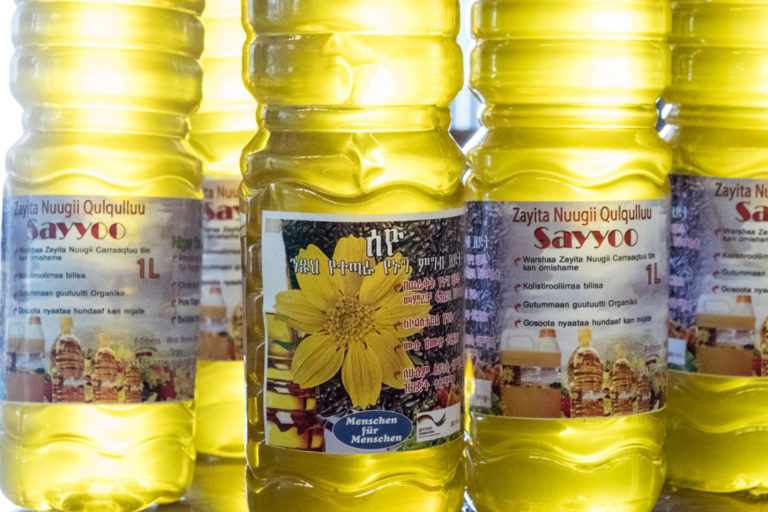
The profits of the “Spring Culture” cooperative are easily calculated: they pay the farmers about 54 euros for 100 kilos of uncleaned Niger seeds. They then sell the cleaned seeds for approx. 62 euros per 100 kilo to the cooperative that extracts the oil from the seeds. The profits of 8 euros per 100 kilo remain with Sheleme Jonfe and the others. “Of course, my family needs the money I earn,” says Sheleme. But the work means more to her. “Having a job gives me self-confidence.” A colleague who was listening added: “Besides which, we women are more independent from our husbands when we earn our own money.”
Future perspective for young people
Boosting agricultural productivity – and at the same time creating jobs in rural areas: the Green Innovation Centre is pursuing a dual goal that may be decisive for Ethiopia’s future. Firstly, because smallholders are the key to food security: According to estimates by the Food and Agricultural Organisation of the United Nations (FAO) in Africa and Asia they produce about 70% of local food, in Ethiopia even 90%. By supporting them they are ensuring that in future the people will be able to provide for themselves. Secondly, they are giving the young generation a perspective. Since the formation of the Menschen für Menschen Foundation the population of Ethiopia has almost tripled from 36 million to 105 million. Today, half of the population is younger than 19 years. This large number of young people represents both a risk and an opportunity. If they are not offered a perspective, it could jeopardize the stability of the country in the medium term. Conversely, the many young Ethiopians represent a great potential for the country and will promote its economic development.
The thirst for action ensuing from such a perspective can be observed on a mound on the fringe of the small town of Seyo. In direct proximity to its local branch office the Menschen für Menschen Foundation established a small business park that effectively became the machine room of the Green Innovation Centre.
Sparkling corrugated iron buildings house first and foremost the cooperatives that need large spaces for their production – or who work with expensive machines that must be protected from theft. Some of them separate the honey from beeswax and other impurities, and fill it into jars. Others manufacture animal feed from crop by-products and additives that are rich in nutrients.
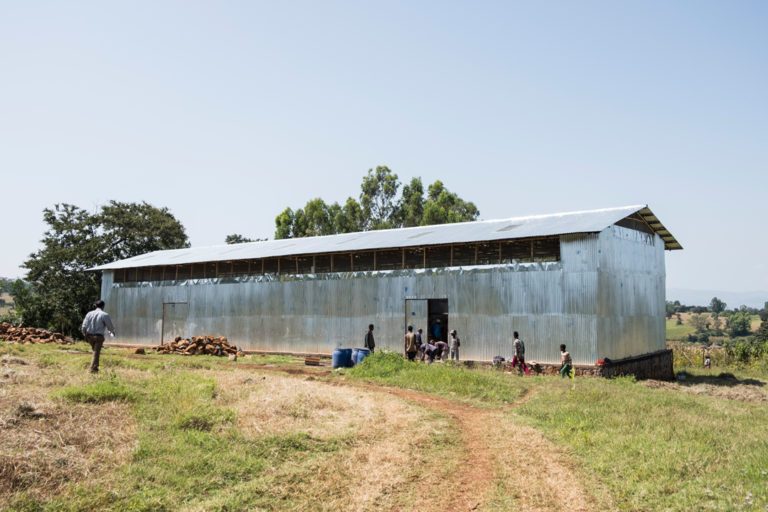
In another hall the machines are pounding, and a nutty aroma permeates the air. The Niger seeds that Sheleme Jonfe and the others cleaned in the back yard in Ayeru are being processed to oil by about ten young men and women. Thanks to well-coordinated teamwork it runs like clockwork. While some of them are pouring buckets of Niger seeds into the oil mill, others are filtering the oil that flows out from the other end of the machine. A third group is disposing of the crushed seeds, which are being mixed into the animal feed in the next building. A fourth uses a funnel to fill the oil into litre bottles, and then it is ready for dispatch.
“For me a dream has come true,” says Jamal Awol, his sporting stature clothed in a beige-coloured overall. Like many young adults, the 25-year-old spokesman of the cooperative looks back on the years in which he lacked any form of career perspective. He succumbed to the temptation of the leaves of the khat shrub, an intoxicant that is widespread in some Ethiopian regions. In Seyo he used to sit at the side of the road, chewing khat and simply letting the day pass by. To support himself he sold the leaves. “My parents suffered greatly during this time,” he says. “They were afraid I would become a criminal.”
“One day we were approached by men from the mayor’s office,” says Jamal. “They told us about the plans to establish agricultural cooperatives here.” They invited him and the others to a two-day seminar. Retrospectively, Jamal thinks that purpose of the long seminar was to test their will. “Many disappeared after a short while and went back to the khat leaves.”
Jamal persisted. He took a series of training courses – ranging from machine operation to accounting. And when the founding of the cooperative was being discussed and they asked him if he wanted to be their spokesman, he did not hesitate for a second.
“I used to doze during the day and was unable to sleep at night, because I was worried about my future,” he says. “Today it’s exactly the opposite: I get up early, work the whole day and have sweet dreams at night. At last I have a goal in life: to make a success of this oil mill.”
